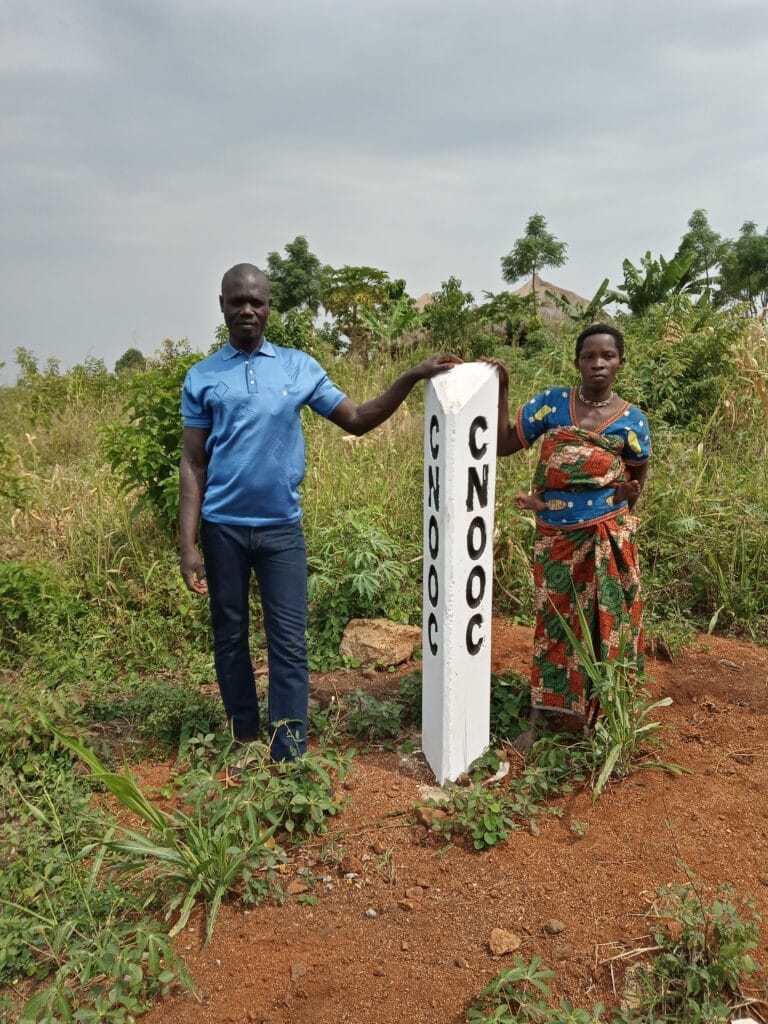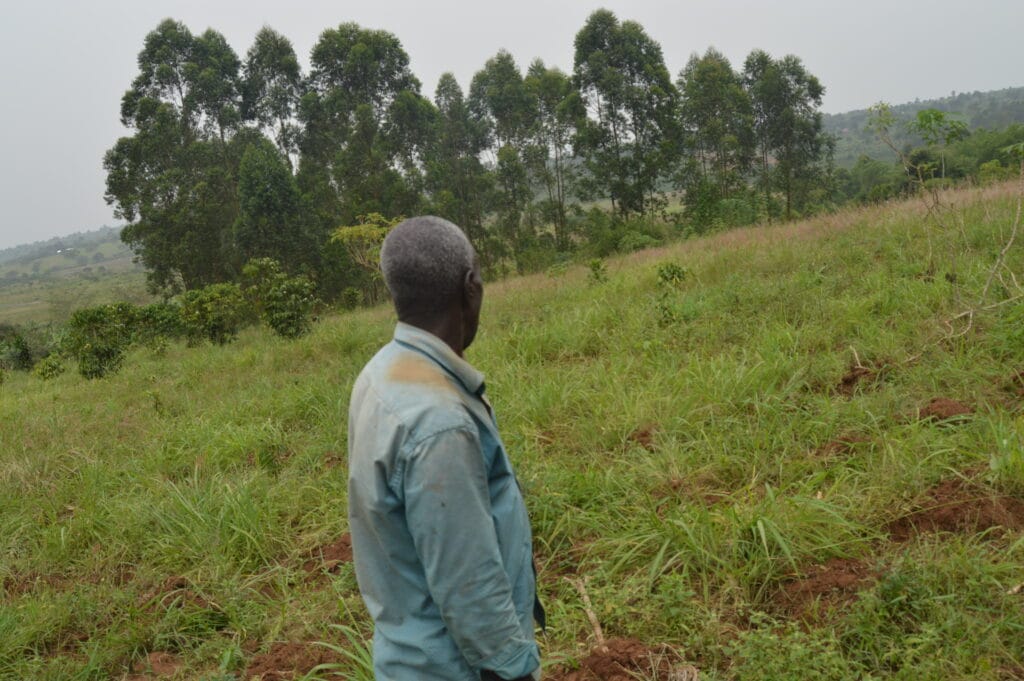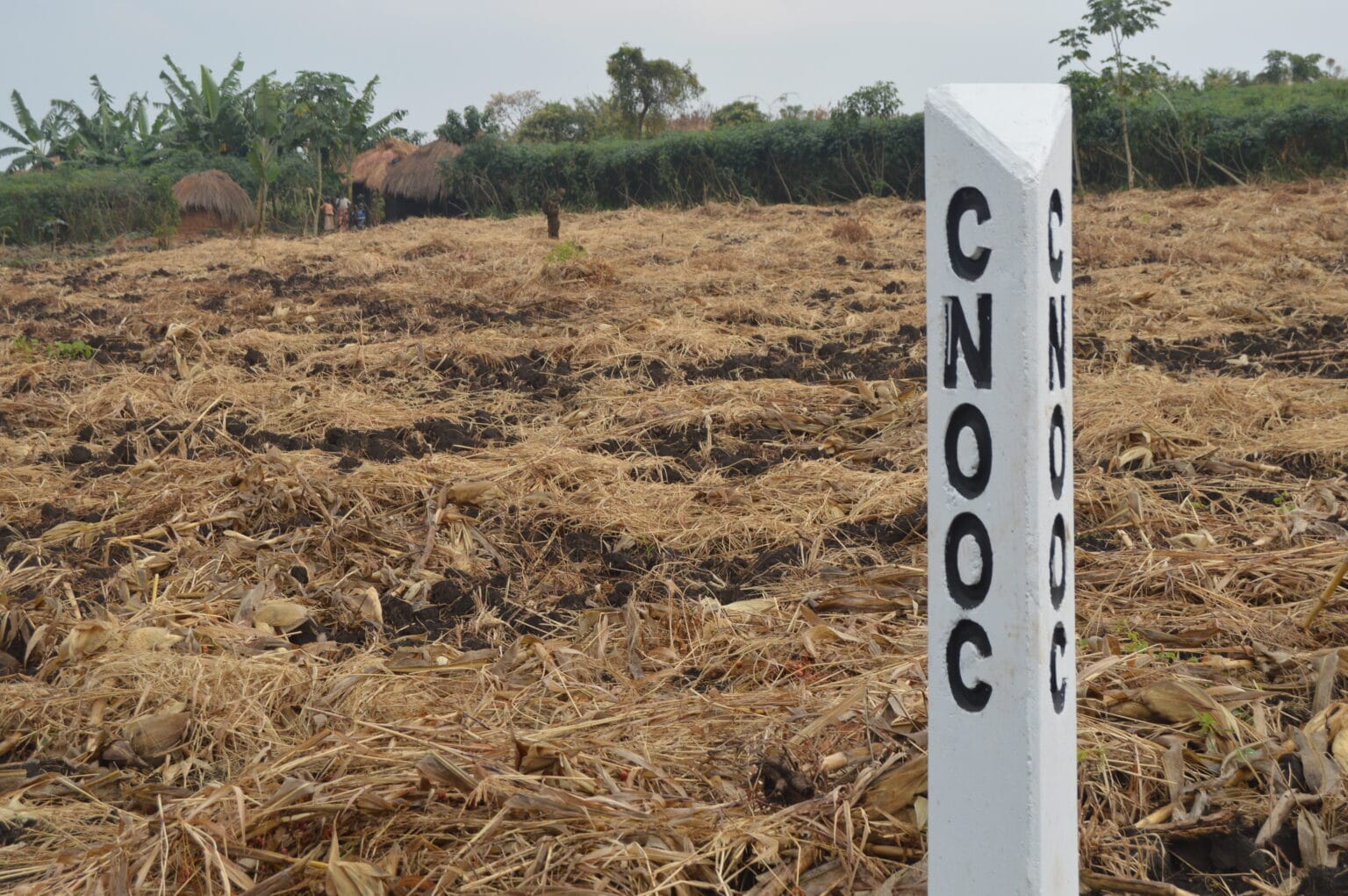Three years ago, Alfred Okumu Weki’s land was identified for acquisition by multinational oil companies and the Ugandan government to pave way for new oil infrastructure in the Albertine region of Western Uganda where major oil reserves were discovered over a decade ago. To this day, however, no pipeline has been built. This has left Weki – and others in the community – in a state of constant limbo, unable to plant crops and earn a livelihood from their land due to fear that at any moment construction could begin.
In 2019, the project’s backers – the Uganda government in partnership with China National offshore Oil Corporation (CNOOC) and Total E&P Uganda – offered Weki 2 million Uganda shillings (US$600) as compensation for losing his land.
But communities are still waiting for this money to come through. And they are now arguing that the wait and their inability to properly invest in their crops due to the ongoing uncertainty means the amount paid to them should be higher. At the same time, new research suggests the oil companies’ handling of the situation is disrupting livelihoods and impacting food security.
The companies’ plan is to construct a feeder pipeline from the Kingfisher development project near Lake Albert on the border with Democratic Republic of Congo that will pass a few metres outside Weki’s house. Each day, crude oil will travel along 1,443 kilometres from Kabaale, in the Albertine region of Uganda, to Tanga in Tanzania. The crude will then arrive at a planned export and processing hub at Kabaale before it connects to East African Crude Oil Pipeline (EACOP) for export.
On April 11, 2021 all project representatives officially signed the final agreements so that construction on the US$3.5 billion EACOP project could begin. It will be the world’s longest electrically heated crude oil pipeline.
Nearly three years since the project was announced and his land surveyed to assess its value, Weki continues to wait for the compensation he was promised. As days of waiting turned into weeks and months, it has left him depressed. He had hoped that this would have been a chance to lift him and his family out of poverty.

He claims the compensation offered is not enough, especially when shared with his two brothers whose land has also been affected by the pipeline’s construction across a 30 metre-wide corridor. “My house is too close to the pipeline corridor and although it does not lie directly on the route of the project, it is too near the pipeline for comfort,” Weki said. “Unfortunately the money has not been paid since 2019 when survey work was done, so I cannot move out.”
“Besides, I doubt this money, when shared with my brothers, will be enough to afford me another house considering the fact that cost of living has gone up since 2019 when assessment was done,” he added.
His story is not unique. It is shared by many other farmers, both in Nyamtai village of Kyangwali sub-county of Kikuube district of Western Uganda and farther out across Ugandan oil fields and along the EACOP corridor, who wait to be paid for losing their land – along with their home and source of livelihood from planting crops – to a crude oil pipeline.
No money has been paid out to any of the over 10,000 people whose land will be used for oil projects since the initial land surveys were done to assess their value and determine compensation.
On top of that, the companies have prevented the farmers from planting long term crops. Landowners like Weki were told by the pipeline companies that they shouldn’t invest in planting crops on their land because it was due to be constructed on at any moment and the companies couldn’t offer any compensation for lost crop revenue.
Researchers in a new study argue that these claims of lost livelihoods resulting from the EACOP project are impacting basic human rights.
A February 2021 study published in Science Direct, concludes: “From an international standards and human rights perspective, the situation in Uganda with EACOP is far from ideal. Arguably, the project has created human rights impacts in terms of the right to food, the right to adequate living conditions, the right to earn a livelihood, and the right to property.”
“Despite the EACOP project’s claims that it was following international standards, there are many ways in which it falls short, especially in relation to delays and the provision of adequate compensation,” state researchers Tom Ogwang and Frank Vanclay of the Urban & Regional Studies Institute at the University of Groningen in The Netherlands.
Like the thousands of families affected by the three projects of Tilenga and Kingfisher, and EACOP that make Uganda one of Africa’s fossil energy powerhouse, Weki laments the loss of being able to fully use his land over the past three years.
“Soon as Atacama, a contractor by CNOOC for survey work, identified the portion of my land to be acquired, they told me not to cultivate perennial crops on it as they could come at any time and start development. They said they would not pay for any crops planted after the date of demarcation,” Weki said.
He would have planted cassava, a perennial tuber and a staple food in the region, had the contractor not earmarked the parcel for the project.
Meanwhile, over 200 kilometres away in the Lwengo district in central Uganda, farmers Charles Namugera and his wife Fortinanta Nakirija have also been told by Total that they will not be compensated for any lost income from crops they cannot sell should construction begin. This means they cannot not increase the size of their coffee crop or invest in expensive chemical fertilisers to boost production.
The company, however, has allowed them to continue growing short term food crops, but not perennial ones due to the likelihood they’ll be able to sell those crops quicker given the uncertain timeline of pipeline construction. Nakirija says this means she will be losing about 120 coffee bushes once Total comes calling – it can take about three to four years for a coffee bush to bear fruit. “We want Total to be fair to us landowners, I have not been taking care of these plants as well as I used to owing to uncertainty,” said Nakirija, “this means I have lost income from reduced production and I want this taken into account when compensation is made.”
She said that she had originally cleared an additional half-acre of land hoping to plant 500 more coffee plants but never planted them due to Total contractor Newplan telling them not to. But, given pipeline construction has yet to begin, had she planted them, Nakirija said, “I would be harvesting some beans already.”
In addition to their loss of use of land, landowners believe their land parcels have appreciated since the oil companies originally demarcated them for acquisition. They now say they will not take compensation based on 2019 valuation and are asking the companies for more money based on current-day value.

In a letter dated February 16, 2021, Total acknowledged to those affected by the Tilenga project that the land valuation will be reviewed. In the letter, Pierre Jessua, Total E&P Uganda general manager, acknowledged that compensation will be raised by between 15-30 percent.
“The Company takes note of the delayed payment and in line with International Finance Corporation standards has drawn up plans to uplift compensation payments to all impacted PAPs [Project Affected Persons],” the official said in response to complaints raised by local NGO Navigators of Development Association (NAVODA) on on behalf of affected persons.
The government of Uganda also acknowledges the grievances saying that consultations were underway as of March to resolve complaints. Land owners should continue tilling the land, but “with the understanding that any new structures would not be compensated,” Ernest Rubondo, executive director at the Petroleum Authority of Uganda (PAU), told DeSmog.
“The next stage in the process is the disclosure of compensation entitlements to the Project Affected Persons, which will commence in April 2021 by Total E&P Uganda and the contractor (Atacama). This will be followed by Financial Literacy training, and then payment of compensation packages and implementation of the livelihood restoration programmes,” he said.
But, since the deal was signed earlier this month officially allowing pipeline construction to kick off, environmental and civil society groups in Uganda are voicing opposition to the government signing the deal, asserting that little information on the economic and environmental costs of the project was made available to the public.
“Information on oil in Uganda remains a secret affair with government guarding critical information. For over 15 years, government and oil companies have fed Ugandans on speculations about oil being a blessing yet all signs show that the way things stand today, oil will destroy our country,” Dickens Kamugisha, CEO of the Africa Institute for Energy Governance (AFIEGO), said in a statement.
The groups are now calling for an independent analysis of the full economic costs arising from climate change, environmental, health, and society to be done and publicly disclosed. “Scant information is provided to the public and parliament,” Kamugisha said of the project, arguing the government and companies continue “to deal secretly when it comes to oil matters.”
Subscribe to our newsletter
Stay up to date with DeSmog news and alerts







